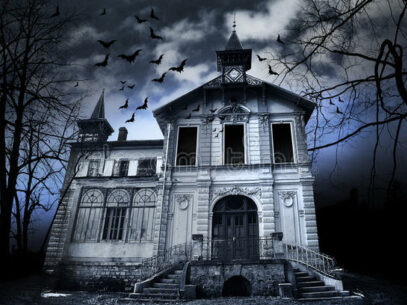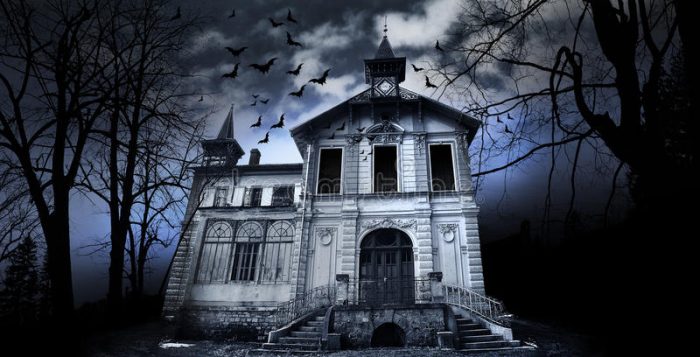
Is that House Haunted?
Buyers, Homeowner tips, Sellers
Stigma and Real Estate Would the fact that property is believed to be haunted affect your decision to purchase it? If a property had been the location of an unspeakable act, would that change your opinion on it? Picture this, you’ve just found the home of your dreams and have put in an offer. Of course you’ll want to make sure that there’s nothing wrong with the home before you firm up so who are you going to call? Ok, so it’s probably your home inspector and not the ghost-busters, however it may surprise you that according to a recent poll by Pollara 27% of Canadians believe in ghosts. In this, the spookiest month of the year, inspired by All Hallows' Eve, we take a closer look at stigma and how you can protect yourself. Defects When selling a home, known physical defects must be disclosed by the listing agent. To give buyers confidence in the property they are purchasing, a home inspection is regularly ordered to ensure that there are no other physical defects unknown to all parties. Physical defects are things that are measurably wrong with the property and could include things such as cracked foundations, leaky pipes, or building not up to code, just to name a few. Where things get a little more complicated is when the factors are non-tangible and in these cases the term “stigma” is used. Anything that may be bothersome to a potential buyer is considered stigma and this can include a death in the home (natural, suicide, or murder) or whether the property is believed to be haunted. Disclosure There is no requirement for the listing agent to disclose stigmas unless they are expressly made aware of them by the seller. Stigmas are difficult to track and few people want to admit that there may be something negative associated with the property they are trying to sell. As a buyer, if this is something that is of major concern to you, it’s important that you take steps to learn as much about the property as possible. But keep in mind that none of these methods can be completely accurate as they rely on personal memories and there are no official directories for such things. Here are a few things that you can do: Google the address - if something has happened at the property in recent years, it is likely to turn up here. Make sure to search specifically the news stories. Check out housecreep.com and search the address. This website is a database that compiles news stories and first hand personal accounts by address. While it largely relies on users to upload information on addresses, you may find the information that you are looking for. If a death in the home is an absolute deal breaker for you for either cultural or personal reasons, you could also consider adding a clause to the Agreement of Purchase and Sale that states that the vendors would have to declare to the best of their knowledge that no death has occurred in the home. The only problem with this is that if the owners are not the original owners, they may not even be aware of the property’s history. Ask the neighbours! Sometimes the neighbours will know more than you might think. Don’t be afraid to knock on doors to see if anyone has anything to tell you. You don’t want to find it out over the fence after you buy. Why Does Stigma Matter? For some people, these non-physical and intangible attributes may elicit a psychological or emotional response. Some people believe that if something terrible happened in a space, that the physical objects present in the space may have absorbed some of that negative energy. Whatever you believe, it’s important that you are comfortable in the home you are buying and that is what is most important. Buying a home can be a bit overwhelming. There can be a lot to think about and do. So, it’s important that you have someone you can trust to make the process as smooth as possible and offer expert advice...contact us anytime!
Would the fact that property is believed to be haunted affect your decision to purchase it? If a property had been the location of an unspeakable act, would that change your opinion on it? Picture this, you’ve just found the home of your dreams and have put in an offer. Of course you’ll want to make sure that there’s nothing wrong with the home before you firm up so who are you going to call? Ok, so it’s probably your home inspector and not the ghost-busters, however it may surprise you that according to a recent poll by Pollara 27% of Canadians believe in ghosts. In this, the spookiest month of the year, inspired by All Hallows' Eve, we take a closer look at stigma and how you can protect yourself. When selling a home, known physical defects must be disclosed by the listing agent. To give buyers confidence in the property they are purchasing, a home inspection is regularly ordered to ensure that there are no other physical defects unknown to all parties. Physical defects are things that are measurably wrong with the property and could include things such as cracked foundations, leaky pipes, or building not up to code, just to name a few. Where things get a little more complicated is when the factors are non-tangible and in these cases the term “stigma” is used. Anything that may be bothersome to a potential buyer is considered stigma and this can include a death in the home (natural, suicide, or murder) or whether the property is believed to be haunted. There is no requirement for the listing agent to disclose stigmas unless they are expressly made aware of them by the seller. Stigmas are difficult to track and few people want to admit that there may be something negative associated with the property they are trying to sell. As a buyer, if this is something that is of major concern to you, it’s important that you take steps to learn as much about the property as possible. But keep in mind that none of these methods can be completely accurate as they rely on personal memories and there are no official directories for such things. Google the address - if something has happened at the property in recent years, it is likely to turn up here. Make sure to search specifically the news stories. For some people, these non-physical and intangible attributes may elicit a psychological or emotional response. Some people believe that if something terrible happened in a space, that the physical objects present in the space may have absorbed some of that negative energy. Whatever you believe, it’s important that you are comfortable in the home you are buying and that is what is most important. Buying a home can be a bit overwhelming. There can be a lot to think about and do. So, it’s important that you have someone you can trust to make the process as smooth as possible and offer expert advice...contact us anytime!
Defects
Disclosure
Here are a few things that you can do:
Check out housecreep.com and search the address. This website is a database that compiles news stories and first hand personal accounts by address. While it largely relies on users to upload information on addresses, you may find the information that you are looking for.
If a death in the home is an absolute deal breaker for you for either cultural or personal reasons, you could also consider adding a clause to the Agreement of Purchase and Sale that states that the vendors would have to declare to the best of their knowledge that no death has occurred in the home. The only problem with this is that if the owners are not the original owners, they may not even be aware of the property’s history.
Ask the neighbours! Sometimes the neighbours will know more than you might think. Don’t be afraid to knock on doors to see if anyone has anything to tell you. You don’t want to find it out over the fence after you buy.Why Does Stigma Matter?
This listing content provided by REALTOR.ca has been licensed by REALTOR® members of The Canadian Real Estate AssociationThe trademarks MLS®, Multiple Listing Service® and the associated logos identify professional services rendered by REALTOR® members of CREA to effect the purchase, sale and lease of real estate as part of a cooperative selling system. The trademarks REALTOR®, REALTORS® and the REALTOR® logo are controlled by The Canadian Real Estate Association (CREA) and identify real estate professionals who are members of CREA.
powered by curious projects